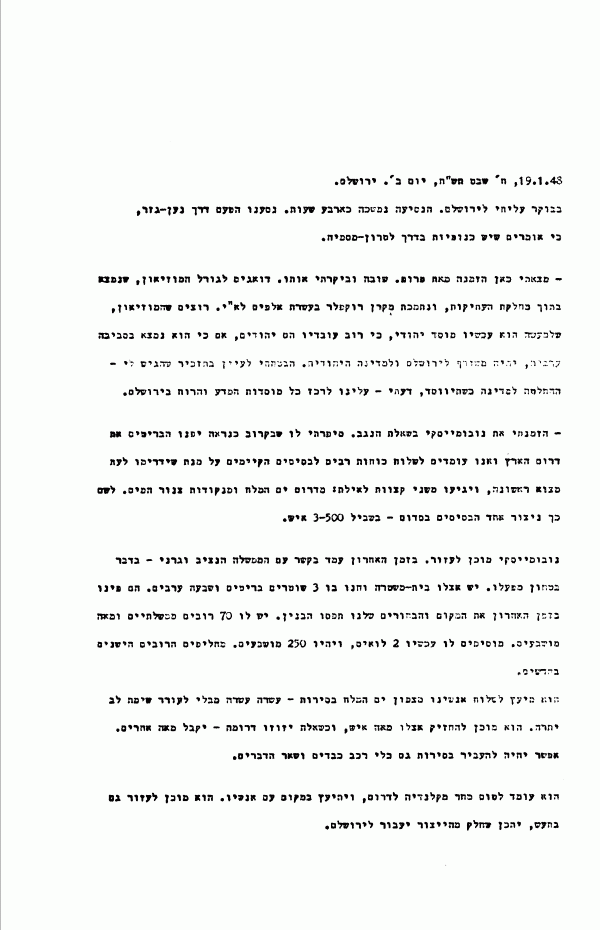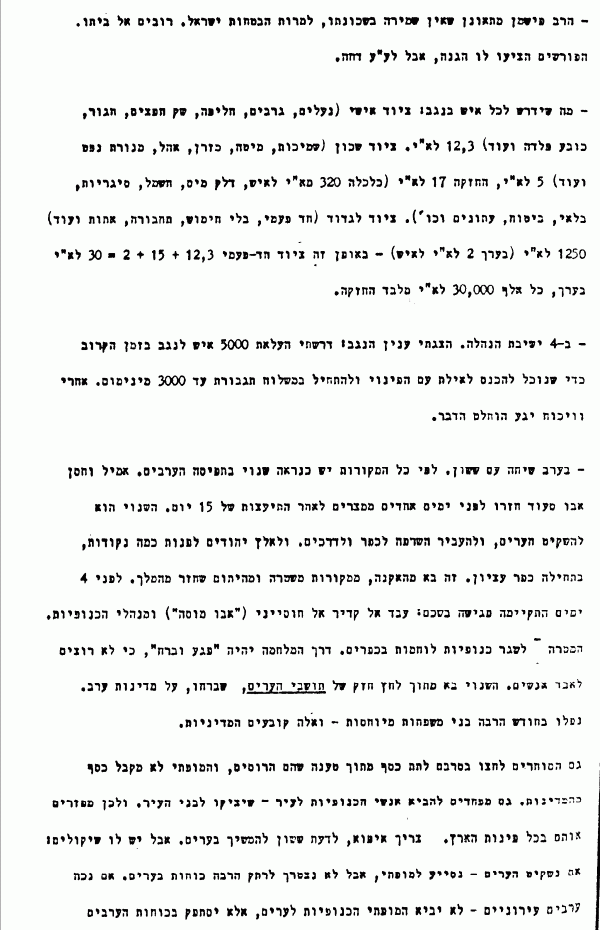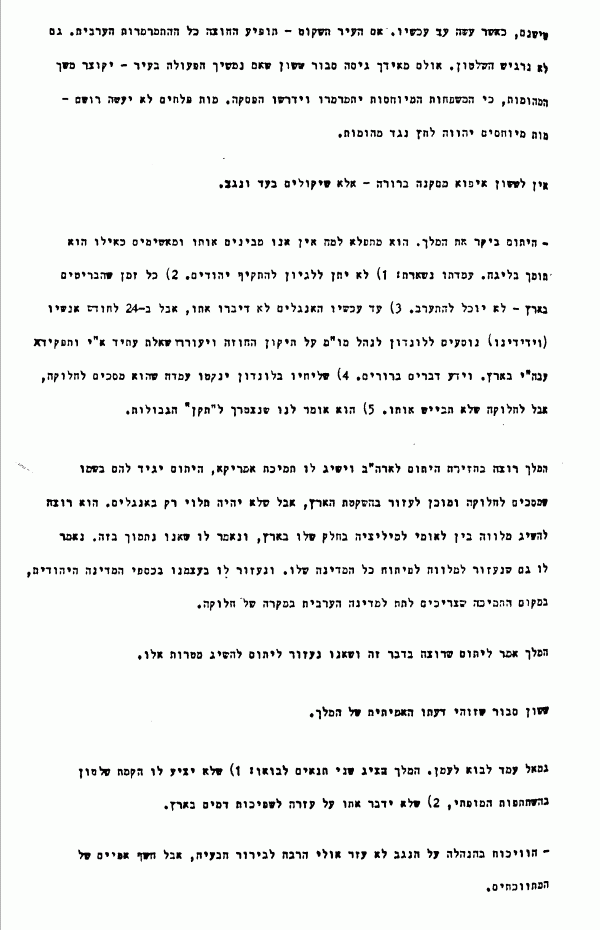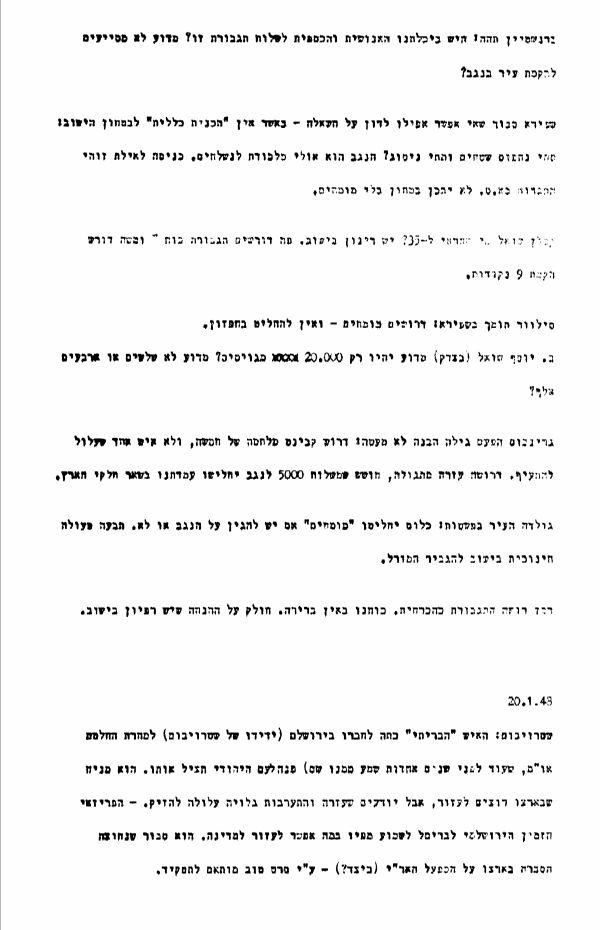1
of
Places:
Jerusalem
Gezer
Na'an
Dead Sea
Amir
Lifta
Egypt
Nablus
England
London
United States
Amman
The use of the photograph is subject to the Copyright Law, 2007
19.01.1948
225348
Monday, 19 January 1948 [Jerusalem] In the morning I traveled to Jerusalem. The trip took four hours. This time we drove through Na’an-Gezer because they say there are gangs along the Latrun-Masmiyya road. – I found an invitation from Prof. [Moshe] Schwabe [of the Hebrew University] and visited him. They’re concerned about the fate of the museum, which is part of the [British Mandatory] Department of Antiquities and receives P£ 10,000 in support from the Rockefeller Foundation. They want the museum, which is now effectively a Jewish institution because most of its employees are Jews even though it’s located in an Arab setting, to be shared by Jerusalem and the Jewish state. I promised to review the memo he gave me. The decision – is for the state once it’s founded; in my view – we should concentrate all the science and humanities institutions in Jerusalem. – I summoned Novomeysky [director of the Palestine Potash Company] on the question of the Negev. I told him that it appears the British will soon be withdrawing from the southern part of the country, and we’re about to send large forces to the existing bases so that they can mobilize southward at the first opportunity and reach Eilat from both ends: from the southern Dead Sea and from the settlements [along the] water pipeline [in the northern Negev]. Towards this end we’ll make one of the bases in Sdom – for 300-500 men. Novomeysky is prepared to help. Recently he’s been in contact with the government, the commissioner, and [First Secretary] Gurney– regarding his factory’s security. He has a police facility that housed 3 British policemen and seven Arabs. They recently evacuated the place and our men seized the building. He has 70 government rifles and 100 [guards]. Now he’s getting another two Lewis [light machine guns] and will have 250 guards. The old rifles are being replaced with new ones. He advises sending our men from the northern Dead Sea by boats – ten at a time, without drawing undue attention. He is prepared to accommodate one hundred men, and when these mobilize southward, he’ll take in another hundred. Heavy vehicles and other equipment can also be transferred by boats. Tomorrow he’ll fly from Kalandiya [the ‘Atarot airfield] to the south [Sdom] and consult with his men there. He’s also prepared to help with Ta’as [home manufacture of weapons]; some of the [Potash Company] production might be transferred to Jerusalem. – Rabbi Fishman [Y.L. Maimon] complains that there’s no protection in his neighborhood, despite promises by Yisrael [Amir – Jerusalem Commander]. His house is coming under rifle fire from the village of Lifta. The secessionists offered him protection, but for now he’s declining it. – Necessities for each man in the Negev: personal equipment (shoes, socks, uniform, rucksack, gear, steel helmet, etc.) P£ 12.3. Accommodation supplies (blankets, bed, food, tent, kerosene lamp, etc.) P£ 5. Upkeep P£ 17 (food and clothing 320 mil per person, fuel, water, electricity, cigarettes, wear-and-tear, insurance, newspapers, etc.). Battalion equipment (one-time, excluding armament, transportation, signal, etc.) P£ 1,250 (about P£ 2 per person) – accordingly, one-time equipment [amounts to] 12.3 + 15 + 2 = approximately P£ 30 [per person]. For every thousand [recruits] P£ 30,000, apart from upkeep. – Executive meeting at 4. I presented the matter of the Negev: I called for an increase of 5,000 men for the Negev soon, so that we’ll be able to enter Eilat with [the British] withdrawal, and to start by sending a reinforcement of up to 3,000 minimum. After an exhausting debate the matter was decided. – In the evening a talk with [Eliahu] Sasson. According to all the sources, there seems to be a shift in the Arab tactics. Emil [Gouri] and Hassan Abu Saud returned from Egypt a few days ago after 15 days of consultation. The change is – to quieten the cities and shift the fire to villages and roads, and to force Jews to evacuate a few settlements, beginning with Kefar Etsiyyon [and the entire Bloc]. This comes from surveillance, police sources, and the “orphan” [an agent of SHAI, the Haganah’s information service, who operated among Arab political circles and in the Transjordanian king’s court], who returned from [visiting] the king [Abdallah]. Four days ago a meeting took place in Nablus: Abd al-Qadir al-Husayni (“Abu Moussa”) and the gang leaders. The goal – to deploy combat gangs to the villages. The method of war fighting will be “hit and run” because they don’t want to lose men. The change stems from strong pressure on Arab countries by city residents who fled. This month many members of prominent families were killed – and they’re the ones who set policy. The merchants also applied pressure, refusing to give money on the grounds that they’re shattered, and the Mufti doesn’t take money from [Arab] states, and they’re afraid to bring gang members to the city – they’d harass the city residents. So they scatter them throughout the country. Therefore, in Sasson’s opinion, we need to continue [our activities] in the city. But he has some considerations: If we quieten the cities – we’ll be aiding the Mufti, but we won’t need to confine many forces to the cities. If we strike at city Arabs – the Mufti won’t bring the gangs to the cities; instead he will make do with the existing Arab forces, as he’s done so far. If the city is quiet – all the Arabic bitterness will surface elsewhere, and we won’t be aggravating the government. On the other hand, Sasson believes that if we continue operating in the city – the riots won’t last as long because the prominent families will complain and demand that it stop. The death of peasants won’t make an impression. The death of dignitaries will create pressure against riots. Therefore Sasson does not have a clear conclusion – but rather considerations pro and con. The “orphan” visited the king. The king is surprised that we don’t understand him and [wonders why we] make accusations, as if he supports the League. His position remains: 1) He won’t let the Legion attack Jews. 2) As long as the British are in the country – he won’t be able to intervene. 3) So far the English haven’t spoken with him, but on the 24th of the month his associates (and our friends) are traveling to London, to negotiate amending the contract [between England and Transjordan] and they’ll raise the question of the future of Eretz Israel and the role of Transjordan in the country, and things will become clear. 4) His emissaries in London will take the position that he agrees to partition, but a partition that does not embarrass him. 5) He tells us that we need to “fix” the borders. The king wants the “orphan” to return to the United States, to secure America’s support for him. The “orphan” will tell them on his behalf that he agrees to partition and is willing to help quieten the country, but that he won’t be dependent only on the English. He wants to secure an international loan for a militia in his part of the country, and he was told that we would support this. He was also told that we would help get a loan for the development of his entire country, and we ourselves would help him using the Jewish state’s funds, instead of the support that would have to be provided to the Arab state in the event of partition. The king told the “orphan” that he wants this, and [he asks] that we help the “orphan” achieve these objectives. Sasson believes that this is the king’s genuine opinion. Jamal [al-Husayni] was about to come to Amman. The king presented two conditions for him to come: 1) That he not propose that he [the king] establish a government in participation with the Mufti. 2) That he not speak with him about abetting the bloodshed in the country. – The argument about the Negev in the Executive might not have helped much in clarifying the problem, but it did reveal the character of the arguers. [Peretz] Bernstein wondered: Do we have the human and financial capability to send this reinforcement? Why aren’t [we] helping build a city in the Negev? [Moshe] Shapira believes we can’t even discuss the question – when there’s no “general plan” for the Yishuv’s security: When do we capture territories and when do we retreat? The Negev might be a trap for those sent there. Entering Eilat is an act of provocation against Ibn Saud. Security is not possible without experts [in strategy]. Kaplan asks who’s responsible for the 35 [a convoy of fighters killed on the way to the Etsiyyon Bloc]? There’s talk in the Yishuv. There’s a demand for reinforcements here – and Moshe [Sharett] is demanding the establishment of 9 settlements. [Abba Hillel] Silver supports Shapira: Experts are needed – and decisions should not be made hastily. B. Joseph [Dov Yosef] (rightly) asks why have only 20,000 conscripts? Why not thirty or forty thousand? [Yitzhak] Gruenbaum displayed more than a little understanding this time: We need a war cabinet of five, rather than one man who might tire. We need help from the Diaspora. He fears that a deployment of 5,000 to the Negev would weaken our fortitude in other parts of the country. Golda [Meir] commented simply: Would we really have “experts” decide whether to defend the Negev or not? She called for educational activities in the Yishuv to boost morale. [David] Remez sees the reinforcement as imperative. Our strength is in [having] “no alternative.” He disputes the assumption that there’s laxity in the Yishuv.












